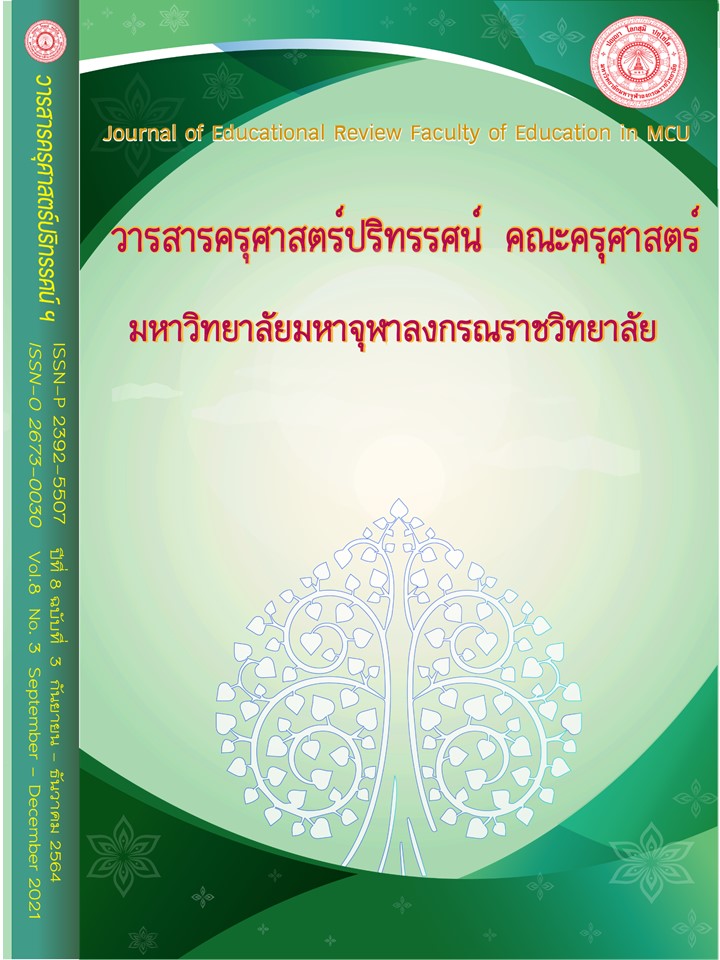MODEL OF CHARACTER DEVELOPMENT BASED ON THE FIVE PRECEPTS FOR SECONDARY STUDENTS UNDER THE JURISDICTION OF THE OFFICE OF THE PRIVATE EDUCATION COMMISSION
Main Article Content
Abstract
The objectives of this research article were 1) to study the state of problems of characteristics based on the 5 precepts of secondary school students, 2) to develop the model of character development based on the 5 precepts, and 3) to propose a model of character development based on the five precepts for secondary students under the Jurisdiction of the office of the private education commission. Mixed methods research was used for the design, and there were 3 steps of research method which were step 1 study the state of problems of characteristics based on the 5 precepts of secondary school students using 1) the questionnaires with 381 teachers, and data was analyzed by using statistics such as mean, percentage, and standard deviation, and 2) interview 5 key informants, and analyze the data with content analysis. Step 2 develop the model of character development based on the 5 precepts which were 1) develop the model by using focus group discussion of 12 experts, analyze the data by content analysis, and 2) validate the model with the evaluation form. The sample consisted of 286 school administrators who analyzed the data with statistics such as mean, percentage and standard deviation. Step 3 propose a model of character development based on the five precepts for secondary students under the Jurisdiction of the office of the private education commission. Results of the research revealed that 1) the state of problems of characteristics based on the 5 precepts of secondary school students in the overall level were at a high level. When considering each aspect, four aspects were shown at high level which were consciousness, right livelihood, benevolence, Kam Sangworn, and verbal truth was at a moderate level. 2) The development of the model of character development based on the 5 precepts is at a high level, and 3) a model of character development based on the five precepts for secondary students under the Jurisdiction of the office of the private education commission consisted of 4 parts, which were part 1 Introduction which were 1) Principles,
2) Objectives, 3) Context of educational institutions; Part 2 Model which were 1) 5 precepts, 2) characteristics according to 5 precepts, 3) process development of the characteristics according to the 5 precepts, 4) Project; Part 3 Implementation of the model which were 1) preparation, 2) implementation, 3) evaluation; and part 4 success conditions.
Article Details
ทัศนะและความคิดเห็นที่ปรากฏในบทความในวารสารฉบับนี้ถือเป็นความรับผิดชอบของผู้เขียนบทความนั้นเพียงผู้เดียว และไม่ถือเป็นทัศนะและความรับผิดชอบของกองบรรณาธิการ
กองบรรณาธิการขอสงวนสิทธิ์ในการคัดเลือกบทความลงตีพิมพ์และจะแจ้งให้เจ้าของบทความทราบหลังจากผู้ประเมินบทความตรวจอ่านบทความแล้ว
ต้นฉบับที่ได้รับการตีพิมพ์ในวารสารครุศาสตร์ปริทรรศน์ คณะครุศาสตร์ มหาวิทยาลัยมหาจุฬาลงกรณราชวิทยาลัย ถือเป็นกรรมสิทธิ์ของคณะครุศาสตร์ มหาวิทยาลัยมหาจุฬาลงกรณราชวิทยาลัย ห้ามนำข้อความทั้งหมดหรือบางส่วนไปพิมพ์ซ้ำ เว้นเสียแต่ว่าจะได้รับอนุญาตจากมหาวิทยาลัยฯ เป็นลายลักษณ์อักษร
References
คณาจารย์มหาวิทยาลัยมหาจุฬาลงกรณราชวิทยาลัย. (2552). พระไตรปิฎกศึกษา. กรุงเทพมหานคร: มหาวิทยาลัยมหาจุฬาลงกรณราชวิทยาลัย.
จำลอง ดิษยวณิช. (2544). จิตวิทยาของความดับทุกข์. เชียงใหม่: กลางเวียงการพิมพ์.
ธานินทร์ ศิลป์จารุ. (2552). การวิจัยและวิเคราะห์ข้อมูลทางสถิติด้วย SPSS. พิมพ์ครั้งที่ 10. กรุงเทพมหานคร: บิสซิเนสอาร์แอนด์ดี.
นิรมล เตียงพิทยากร. (2560). รูปแบบการส่งเสริมการรักษาศีล 5 สำหรับสถานศึกษา สังกัดสำนักงานเขตพื้นที่การศึกษามัธยมศึกษา. ดุษฎีนิพนธ์พุทธศาสตรดุษฎีบัณฑิต. มหาวิทยาลัยมหาจุฬาลงกรณราชวิทยาลัย.
บุญมี แท่นแก้ว. (2547). พระพุทธ. พิมพ์ครั้งที่ 2. กรุงเทพมหานคร: โอ.เอ.พริ้นติ้ง เฮ้า.
พระเทวินทร์ เทวินฺโท. (2544). พุทธจริยศาสตร์ จริยศาสตร์ และจริยธรรม. นนทบุรี: สหมิตรพริ้นติ้ง.
พระธรรมปิฎก (ประยุทธ์ ปยุตฺโต). (2542). พจนานุกรมพุทธศาสนฉบับประมวลศัพท์. พิมพ์ครั้งที่ 9. กรุงเทพมหานคร: โรงพิมพ์มหาจุฬาลงกรณราชวิทยาลัย.
พระมหาธีรธรรม ธมฺมธีโร (บุญเสริม). (2559). รูปแบบการบริหารการจัดกิจกรรมเพื่อส่งเสริมเบญจธรรมสำหรับสถานศึกษา สังกัดสำนักงานเขตพื้นที่การศึกษามัธยมศึกษา. ดุษฎีนิพนธ์พุทธศาสตรดุษฎีบัณฑิต. มหาวิทยาลัยมหาจุฬาลงกรณราชวิทยาลัย.
รังสรรค์ แสงสุขและคณะ. (2544). ความรู้คู่คุณธรรม. พิมพ์ครั้งที่ 2. กรุงเทพมหานคร: มหาวิทยาลัยรามคำแหง.
วงศกร เพิ่มผล. (2555). ศีล 5 : มิติอารยธรรมสากล. ดุษฎีนิพนธ์ศาสนศาสตรดุษฎีบัณฑิต. มหาวิทยาลัยมหามกุฏราชวิทยาลัย.
วสิน อินทสระ. (2549). พุทธจริยา. พิมพ์ครั้งที่ 2. กรุงเทพมหานคร: สำนักพิมพ์ธรรม.
สมชาย วรกิจเกษมสกุล. (2553). ระเบียบวิธีการวิจัยทางพฤติกรรมศาสตร์และสังคมศาสตร์. อุดรธานี: คณะครุศาสตร์ มหาวิทยาลัยราชภัฏอุดรธานี.
สุพัตรา สุภาพ. (2549). ปัญหาสังคม. พิมพ์ครั้งที่ 20. กรุงเทพมหานคร: โรงพิมพ์ไทยวัฒนาพานิช.


